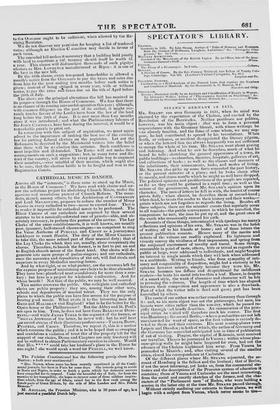CATHEDRAL MUSIC IN DANGER.
AMONG all the "interests," is there none to stand up for Music, in the House of Commons ? We have read with shame and sor- row the nefarious project for abolishing Church Music, under the specious and scandalous pretext of Church Reform. The mani- festo, signed, among others, by the Archbishop of CANTERBURY and Lord MELBOURNE, proposes to reduce the number of Minor Canons in every cathedral to two—never to exceed four. That is to render it impossible for cathedral music to be performed. The Minor Canons of our cathedrals are required by their several statutes to be a musically-educated race of priests—able, and ab- solutely necessary, to perform this portion of the service. The Lay Clerks of the same establishments, it is well known, are usually poor, ignorant, half-starved chorus-singers—as competent to sing the Verse Anthems of PURCELL and CROFT as a journeyman bricklayer to enact Hamlet. The duty of the Minor Canons is to take this, the more refined part of their musical duty; that of the Lay Clerks (to which they are, usually, alone competent) the chorus. Therefore, to banish the former, is in fact to put an end to English church music of the finest kind. Our choirs will de- generate into mere groups of psalm-singers; and our cathedrals, once the nurseries and depositories of the art, will find rivals and superiors in every Methodist meeting-house.
And by what right, or on what pretext, are the revenues left for the express purpose of maintaining our choirs to be thus alienated? They have beech plundered most scandalously for more than a cen- tury; but here is a project for wholesale confiscation. And for whose benefit? Not that of the public, we may be well assured.
This matter concerns the public. Our collegiate and cathedral choirs are public property : they are, among their other uses, schools and depositories of musical talent. They are the only places to which the public can have free access tbr the purpose of bearing giod music. What avails it to the labouring man that GRUA and MALIBRAN visit England? what is he the better for the Opera-house or the Philharmonic? But the Abbey and St. Paul's are open to him. True, he does not hear there BELLINI or DONI- ZETTI,—and while JAMES TURLE is the organist of the former, or THOMAS Arrwoon of the latter, he never will : but he will hear ne sacred strains of their illustrious predecessors—TmAis, Blow, Puireeet, and CROFT. Therefore, we repeat it, this is a matter which concerns the public ; and it is to be hoped that so sweeping and scandalous a violation of trust (for of the property left for the support of our choirs, Deans and Chapters are only trustees) will not be suffered to obtain Parliamentary sanction in silence. Would that Mrs. * * * * * could take her husband's place in the House for one night ! she would speak a word for PURCELL, we well know.


























 Previous page
Previous page